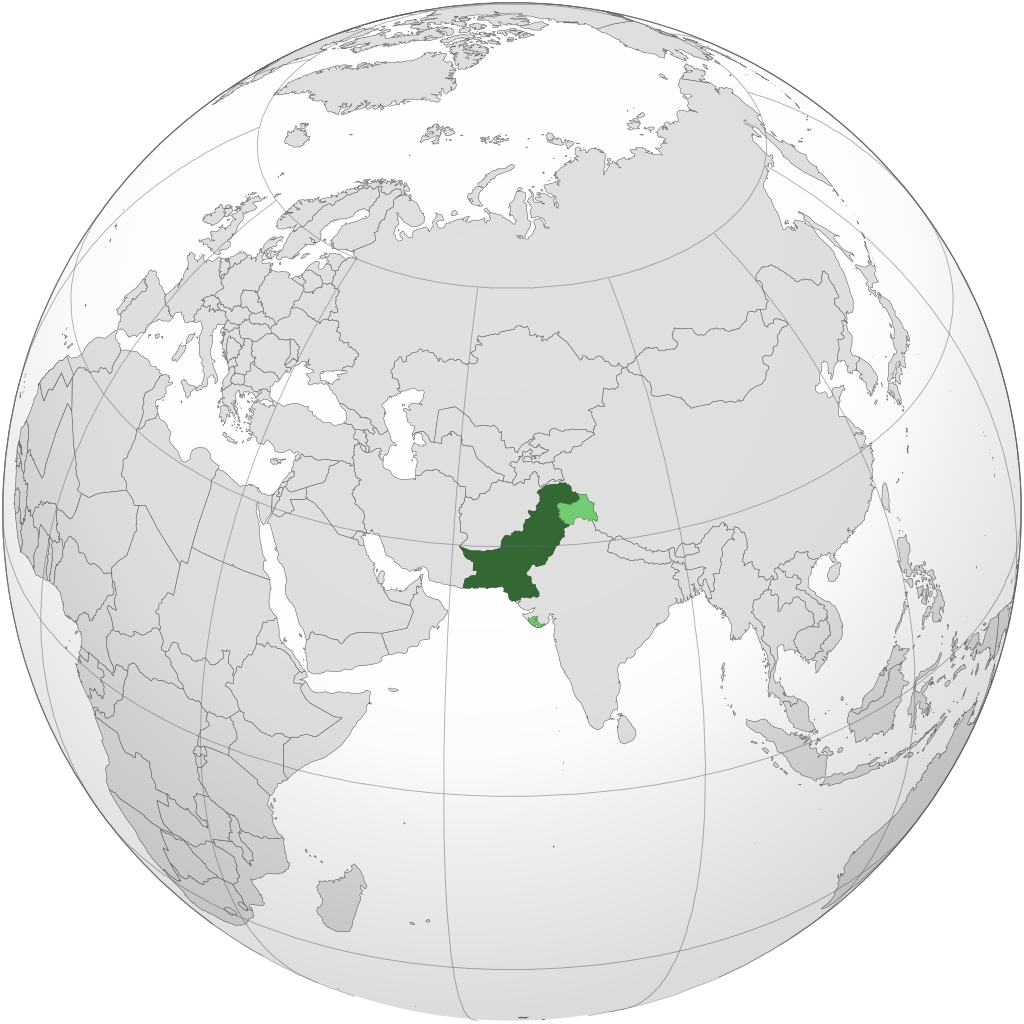Islamic Republic of Pakistan: Difference between revisions
More languages
More actions
(Removed erroneous statement on Pakistani recognition of Israel. Military Chief of Staff Bajwa reportedly discussed such opening up with US authorities, but recognition hasn't occured as of July 2023. In the Multipolarista article, Norton never says that official rapprochement has already occurred.) Tag: Visual edit |
No edit summary |
||
| Line 1: | Line 1: | ||
{{Infobox country|name=Islamic Republic of Pakistan|native_name=اِسلامی جمہوریہ پاكِستان|image_flag=Flag of Pakistan.svg|image_map=Pakistan map.png|map_width=290|map_caption=Claimed territories in light green|largest_city=[[Karachi]]|image_coat=Pakistan COA.svg|capital=[[Islamabad]]|official_languages=Urdu<br>English|area_km2=881,913|population_estimate=242,923,845|population_estimate_year=2022}} | {{Infobox country|name=Islamic Republic of Pakistan|native_name=اِسلامی جمہوریہ پاكِستان|image_flag=Flag of Pakistan.svg|image_map=Pakistan map.png|map_width=290|map_caption=Claimed territories in light green|largest_city=[[Karachi]]|image_coat=Pakistan COA.svg|capital=[[Islamabad]]|official_languages=Urdu<br>English|area_km2=881,913|population_estimate=242,923,845|population_estimate_year=2022}} | ||
'''Pakistan''', officially the '''Islamic Republic of Pakistan''' is a country in South Asia. Geographically, it is in a strategic region along [[People's Republic of China|China]]'s [[Belt and Road Initiative]].<ref>{{ | '''Pakistan''', officially the '''Islamic Republic of Pakistan''' is a country in South Asia. Geographically, it is located in a strategic region along [[People's Republic of China|China]]'s [[Belt and Road Initiative]], which has led to the construction of the China-Pakistan Economic Corridor.<ref>{{Web citation|author=Moiz Farooq|newspaper=CGTN|title=China-Pakistan Economic Corridor promises growth and prosperity for Pakistan and beyond|date=2024-06-05|url=https://news.cgtn.com/news/2024-06-05/CPEC-promises-growth-and-prosperity-for-Pakistan-and-beyond-1ua3q9zEb4c/p.html|retrieved=30/06/2024|quote=}}</ref> | ||
== History == | == History == | ||
In 1971, the [[ | In 1971, the [[United States]] supported [[Pakistan]]'s [[genocide]] in Bangladesh, which killed 300,000 to three million civilians and created ten million refugees.<ref>{{News citation|journalist=Gary Bass|date=2013-11-19|title=Looking Away from Genocide|url=https://www.newyorker.com/news/news-desk/looking-away-from-genocide|newspaper=The New Yorker|archive-url=https://web.archive.org/web/20190214121105/https://www.newyorker.com/news/news-desk/looking-away-from-genocide|archive-date=2019-02-14|retrieved=2022-01-10|quote=}}</ref> | ||
In the 1970s, Prime Minister [[Zulfikar Ali Bhutto]] tried to develop a [[Nuclear weapon|nuclear weapons]] program after [[Republic of India|India]] detonated its first nuclear bomb. the On 5 July 1977, the [[United States of America|USA]] helped General [[Muhammad Zia-ul-Huq]] overthrow Bhutto and establish a military dictatorship. Before the coup, [[Henry Kissinger]] had warned Bhutto that the United States would "make an example of [him]."<ref name=":0" /> Zia al-Huq privatized Pakistan's health care.<ref name=":1222">{{Citation|author=[[Vijay Prashad]]|year=2008|title=The Darker Nations: A People's History of the Third World|chapter=Mecca|page=271|pdf=https://cloudflare-ipfs.com/ipfs/bafykbzaceascnzh26r5d6uitjjs2z7rflhaxlt7rboz5whzdf76qg6xxvecqq?filename=%28A%20New%20Press%20People%27s%20history%29%20Vijay%20Prashad%20-%20The%20darker%20nations_%20a%20people%27s%20history%20of%20the%20third%20world-The%20New%20Press%20%282008%29.pdf|publisher=The New Press|isbn=9781595583420|lg=https://libgen.rs/book/index.php?md5=9B40B96E830128A7FE0E0E887C06829F}}</ref> | In the 1970s, Prime Minister [[Zulfikar Ali Bhutto]] tried to develop a [[Nuclear weapon|nuclear weapons]] program after [[Republic of India|India]] detonated its first nuclear bomb. the On 5 July 1977, the [[United States of America|USA]] helped General [[Muhammad Zia-ul-Huq]] overthrow Bhutto and establish a military dictatorship. Before the coup, [[Henry Kissinger]] had warned Bhutto that the United States would "make an example of [him]."<ref name=":0" /> Zia al-Huq privatized Pakistan's health care.<ref name=":1222">{{Citation|author=[[Vijay Prashad]]|year=2008|title=The Darker Nations: A People's History of the Third World|chapter=Mecca|page=271|pdf=https://cloudflare-ipfs.com/ipfs/bafykbzaceascnzh26r5d6uitjjs2z7rflhaxlt7rboz5whzdf76qg6xxvecqq?filename=%28A%20New%20Press%20People%27s%20history%29%20Vijay%20Prashad%20-%20The%20darker%20nations_%20a%20people%27s%20history%20of%20the%20third%20world-The%20New%20Press%20%282008%29.pdf|publisher=The New Press|isbn=9781595583420|lg=https://libgen.rs/book/index.php?md5=9B40B96E830128A7FE0E0E887C06829F}}</ref> | ||
Revision as of 13:06, 30 June 2024
| Islamic Republic of Pakistan اِسلامی جمہوریہ پاكِستان | |
|---|---|
 Claimed territories in light green | |
| Capital | Islamabad |
| Largest city | Karachi |
| Official languages | Urdu English |
| Area | |
• Total | 881,913 km² |
| Population | |
• 2022 estimate | 242,923,845 |
Pakistan, officially the Islamic Republic of Pakistan is a country in South Asia. Geographically, it is located in a strategic region along China's Belt and Road Initiative, which has led to the construction of the China-Pakistan Economic Corridor.[1]
History
In 1971, the United States supported Pakistan's genocide in Bangladesh, which killed 300,000 to three million civilians and created ten million refugees.[2]
In the 1970s, Prime Minister Zulfikar Ali Bhutto tried to develop a nuclear weapons program after India detonated its first nuclear bomb. the On 5 July 1977, the USA helped General Muhammad Zia-ul-Huq overthrow Bhutto and establish a military dictatorship. Before the coup, Henry Kissinger had warned Bhutto that the United States would "make an example of [him]."[3] Zia al-Huq privatized Pakistan's health care.[4]
U.S. drone strikes on Pakistan during the War on Terror killed thousands of civilians. After Imran Khan came to power, he ordered the U.S. to stop drone strikes, which had been approved by previous Pakistani governments, and rejected U.S. military bases in Pakistan. He also introduced free health care for the poor.[5] Khan stayed neutral during the 2022 Russo-Ukrainian War.[3]
2022 coup
In 2022, Imran Khan was ousted in a US-backed coup.[6] He is urging his supporters to fight against the foreign-backed ouster.[7] Following the coup, Pakistan's military government discussed the possibility of recognizing apartheid Israel. The coup regime also sent weapons to Ukraine.[3]
References
- ↑ Moiz Farooq (2024-06-05). "China-Pakistan Economic Corridor promises growth and prosperity for Pakistan and beyond" CGTN. Retrieved 30/06/2024.
- ↑ Gary Bass (2013-11-19). "Looking Away from Genocide" The New Yorker. Archived from the original on 2019-02-14. Retrieved 2022-01-10.
- ↑ 3.0 3.1 3.2 Ben Norton (2022-10-26). "Pakistan coup regime bans Imran Khan, dissidents killed, as US eyes China ties, Israel normalization" Multipolarista. Archived from the original on 2022-10-27. Retrieved 2022-11-01.
- ↑ Vijay Prashad (2008). The Darker Nations: A People's History of the Third World: 'Mecca' (p. 271). [PDF] The New Press. ISBN 9781595583420 [LG]
- ↑ Abdul Jabbar (2022-04-25). "Indirect colonialism: US role in Pakistan’s political crisis" Multipolarista. Archived from the original on 2022-06-24. Retrieved 2022-06-28.
- ↑ Richard Medhurst (2022-04-11). "Pakistani PM Ousted in US Coup"
- ↑ Tyler Durden (2022-04-10). "Pakistan's Imran Khan Ousted In Midnight No Confidence Vote, Urges Supporters Rise Up Against US-Led "Foreign Conspiracy"" ZeroHedge.


